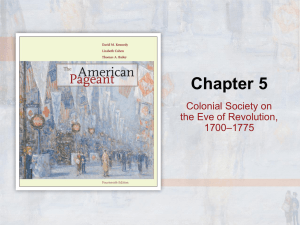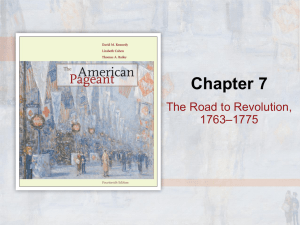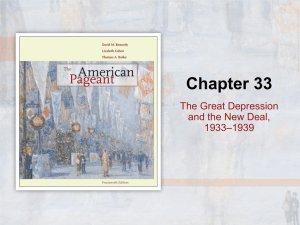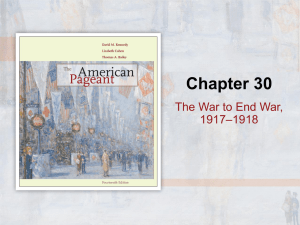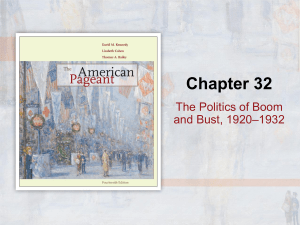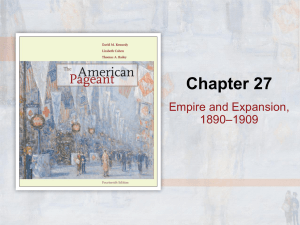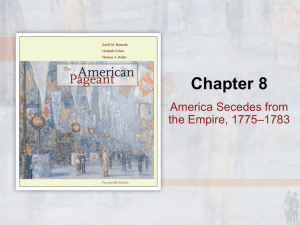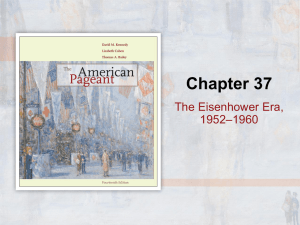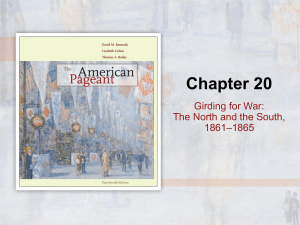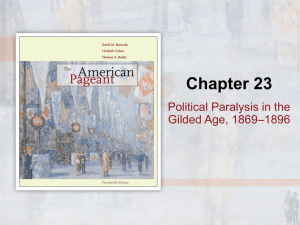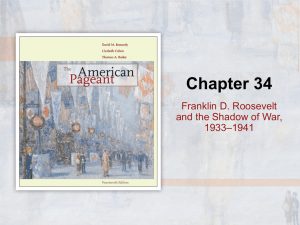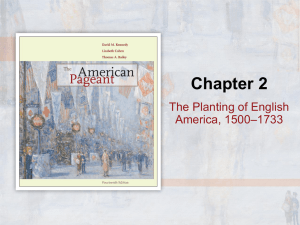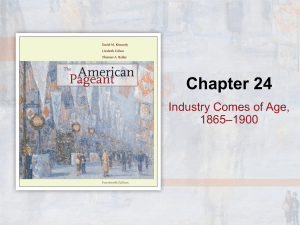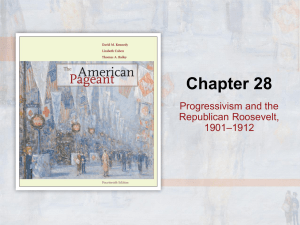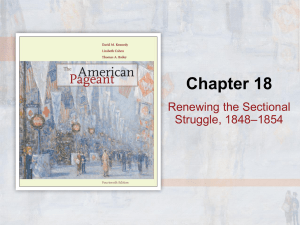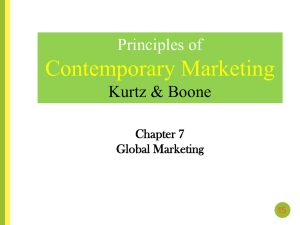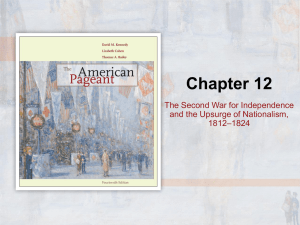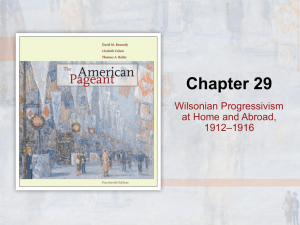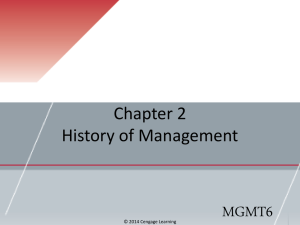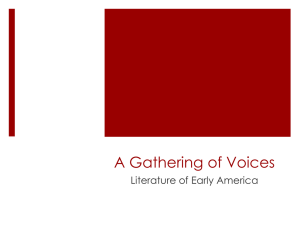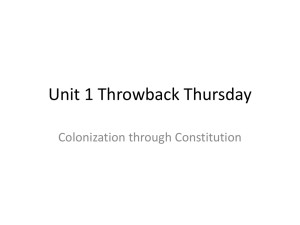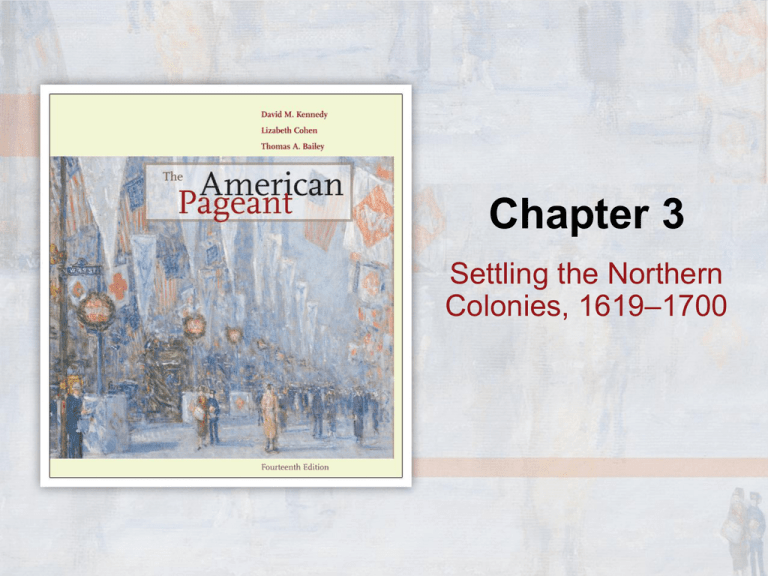
Chapter 3
Settling the Northern
Colonies, 1619–1700
Question
All of the following were true of the Puritans of
New England EXCEPT
a) Calvinism became their dominant theological credo.
b) many came from the commercially depressed
woolen districts.
c) they rejected the Calvinist belief in the Elect (saved)
and unregenerate (damned).
d) the most devout Puritans, believed that only “visible
saints” should be admitted to church membership.
Copyright © Cengage Learning. All rights reserved.
3|2
Answer
All of the following were true of the Puritans of
New England EXCEPT
a) Calvinism became their dominant theological credo.
b) many came from the commercially depressed
woolen districts.
c) they rejected the Calvinist belief in the Elect (saved)
and unregenerate (damned). (correct)
d) the most devout Puritans, believed that only “visible
saints” should be admitted to church membership.
Hint: See pages 46–47.
Copyright © Cengage Learning. All rights reserved.
3|3
Question
All of the following were true of the Mayflower Compact
EXCEPT
a) before disembarking from the Mayflower, the Pilgrim
leaders drew up and signed this brief document.
b) it was the first true constitution
in American history.
c) it set an invaluable precedent for later written
constitutions.
d) it was a simple agreement to form a crude
government and to submit to the will of the majority
under the regulations agreed upon.
Copyright © Cengage Learning. All rights reserved.
3|4
Answer
All of the following were true of the Mayflower Compact
EXCEPT
a) before disembarking from the Mayflower, the Pilgrim
leaders drew up and signed this brief document.
b) it was the first true constitution
in American history. (correct)
c) it set an invaluable precedent for later written
constitutions.
d) it was a simple agreement to form a crude
government and to submit to the will of the majority
under the regulations agreed upon.
Hint: See page 47.
Copyright © Cengage Learning. All rights reserved.
3|5
Question
All of the following were true of the Separatist
settlers of Plymouth EXCEPT
a) a group of the Separatists in Holland secured rights
to settle under the Virginia Company’s jurisdiction.
b) they did not make their initial landing at Plymouth
Rock, but undertook a number of preliminary
surveys.
c) they were without legal right to the land and without
specific authority to establish a government.
d) every member of the initial Mayflower expedition
was a Separatist.
Copyright © Cengage Learning. All rights reserved.
3|6
Answer
All of the following were true of the Separatist
settlers of Plymouth EXCEPT
a) a group of the Separatists in Holland secured rights
to settle under the Virginia Company’s jurisdiction.
b) they did not make their initial landing at Plymouth
Rock, but undertook a number of preliminary
surveys.
c) they were without legal right to the land and without
specific authority to establish a government.
d) every member of the initial Mayflower expedition
was a Separatist. (correct)
Hint: See page 47.
Copyright © Cengage Learning. All rights reserved.
3|7
Question
The main proponent of Antinomianism, or the
belief that the truly saved need not bother to obey
the law of either God or man, was
a) Roger Williams.
b) Anne Hutchinson.
c) Cotton Mather.
d) John Winthrop.
Copyright © Cengage Learning. All rights reserved.
3|8
Answer
The main proponent of Antinomianism, or the
belief that the truly saved need not bother to obey
the law of either God or man, was
a) Roger Williams.
b) Anne Hutchinson. (correct)
c) Cotton Mather.
d) John Winthrop.
Hint: See page 51.
Copyright © Cengage Learning. All rights reserved.
3|9
Question
The Pequot War took place between the Pequot
tribe and colonists of
a) Massachusetts Bay.
b) Plymouth.
c) Virginia.
d) Maryland.
Copyright © Cengage Learning. All rights reserved.
3 | 10
Answer
The Pequot War took place between the Pequot
tribe and colonists of
a) Massachusetts Bay. (correct)
b) Plymouth.
c) Virginia.
d) Maryland.
Hint: See pages 53–54.
Copyright © Cengage Learning. All rights reserved.
3 | 11
Question
The main issue behind King Philip’s War, from the
colonists’ viewpoint, was
a) inter-colonial trade.
b) religion.
c) wampum.
d) land.
Copyright © Cengage Learning. All rights reserved.
3 | 12
Answer
The main issue behind King Philip’s War, from the
colonists’ viewpoint, was
a) inter-colonial trade.
b) religion.
c) wampum.
d) land. (correct)
Hint: See page 54.
Copyright © Cengage Learning. All rights reserved.
3 | 13
Question
All of the following were true of the Dominion of
New England EXCEPT
a) it was enthusiastically received by the colonists
because it provided for their defense.
b) unlike the homegrown New England Confederation,
it was imposed from London.
c) embracing at first all New England, it was expanded
two years later to include New York and East and
West Jersey.
d) the dominion also aimed at bolstering colonial
defense in the event of war with the Indians.
Copyright © Cengage Learning. All rights reserved.
3 | 14
Answer
All of the following were true of the Dominion of
New England EXCEPT
a) it was enthusiastically received by the colonists
because it provided for their defense. (correct)
b) unlike the homegrown New England Confederation,
it was imposed from London.
c) embracing at first all New England, it was expanded
two years later to include New York and East and
West Jersey.
d) the dominion also aimed at bolstering colonial
defense in the event of war with the Indians.
Hint: See page 55.
Copyright © Cengage Learning. All rights reserved.
3 | 15
Question
The primary purpose of the Navigation Laws was to
a) provide revenue to support the ever-increasing British colonial
appetite.
b) sew together the patchwork Confederation of New England into
a more tightly knit, cohesive instrument of colonial control.
c) stitch England’s colonies more tightly to the motherland by
throttling American trade with countries not ruled by the English
crown.
d) encourage British and American merchant marine to use the
friendlier southern route supported by gentler westerly winds.
Copyright © Cengage Learning. All rights reserved.
3 | 16
Answer
The primary purpose of the Navigation Laws was to
a) provide revenue to support the ever-increasing British colonial
appetite.
b) sew together the patchwork Confederation of New England into
a more tightly knit, cohesive instrument of colonial control.
c) stitch England’s colonies more tightly to the motherland by
throttling American trade with countries not ruled by the English
crown. (correct)
d) encourage British and American merchant marine to use the
friendlier southern route supported by gentler westerly winds.
Hint: See page 55.
Copyright © Cengage Learning. All rights reserved.
3 | 17
Question
The period of Salutary neglect best describes an era
a) beginning with William and Mary, when the much-resented
Navigation Laws were only weakly enforced.
b) of increased royal authority, when colonists were punished
severely for failing to salute agents of the British Crown.
c) in which Britain renounced its colonial claims on its American
colonies and began to focus on the Indian subcontinent.
d) of decreased customs duties, which were nonetheless more
rigorously enforced.
Copyright © Cengage Learning. All rights reserved.
3 | 18
Answer
The period of Salutary neglect best describes an era
a) beginning with William and Mary, when the much-resented
Navigation Laws were only weakly enforced. (correct)
b) of increased royal authority, when colonists were punished
severely for failing to salute agents of the British Crown.
c) in which Britain renounced its colonial claims on its American
colonies and began to focus on the Indian subcontinent.
d) of decreased customs duties, which were nonetheless more
rigorously enforced.
Hint: See page 56.
Copyright © Cengage Learning. All rights reserved.
3 | 19
Question
All of the following were true of William Penn
EXCEPT
a) his colony of Pennsylvania was by far the best
advertised of all the colonies.
b) he made a serious effort to live in harmony with the
Indians.
c) he hoped to experiment with liberal ideas in
government and, at the same time, make a profit.
d) his stingy land policy, which encouraged minimal
holdings, prevented a heavy inflow
of immigrants.
Copyright © Cengage Learning. All rights reserved.
3 | 20
Answer
All of the following were true of William Penn
EXCEPT
a) his colony of Pennsylvania was by far the best
advertised of all the colonies.
b) he made a serious effort to live in harmony with the
Indians.
c) he hoped to experiment with liberal ideas in
government and, at the same time, make a profit.
d) his stingy land policy, which encouraged minimal
holdings, prevented a heavy inflow
of immigrants. (correct)
Hint: See page 61.
Copyright © Cengage Learning. All rights reserved.
3 | 21

